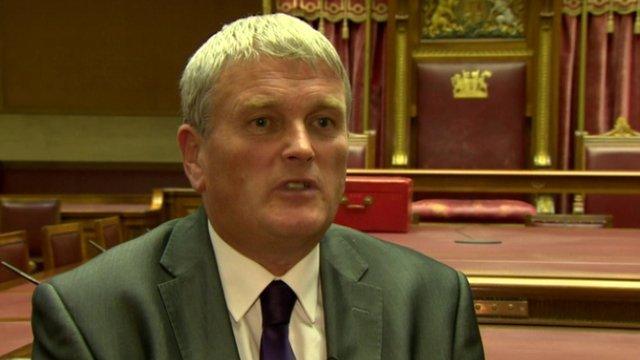Jim Wells: NI health minister 'will not abandon religious beliefs' in policies
- Published
Jim Wells told BBC News NI's Marie-Louise Connolly that he will not abandon his religious beliefs
Northern Ireland's new health minister has said he will not abandon his religious principles when making policy on issues like abortion and alcohol.
Jim Wells, from the Democratic Unionist Party, was appointed last month as the result of DUP ministerial reshuffle.
He told the BBC he would "always stand by the rights of the unborn child" and said he opposed "abortion on demand".
During his first broadcast interview as minister, he also warned his department was facing a £60m budget shortfall.
Mr Wells warning that there would be serious consequences for patient services, including some in his own constituency, if the Northern Ireland Executive did not allocate more funding for health.
Contentious issues
The health ministry is considered to be one of the most challenging jobs in the Northern Ireland Executive, and Mr Wells is taking over a time of wide-spread public spending cuts.
However, on top of well-publicised budget problems, the new minister faces a number of highly contentious and emotive issues, including whether gay men will be allowed to donate blood and the publication of the long-awaited abortion guidelines for medical staff.
Currently, the rules on blood donation and abortion in Northern Ireland differ considerably from the rest of the UK.
The health minister's predecessor, Edwin Poots, maintained a lifetime ban on gay men donating blood in Northern Ireland, despite the rules being relaxed in England, Scotland and Wales in 2011.
Abortion is only legal in Northern Ireland if a woman's life is in danger, or if there is a risk of permanent and serious damage to her mental or physical health.
'Personal views'
Mr Wells said he "will not accept" the extension of the UK's 1967 Abortion Act to Northern Ireland.
"In England, that has led to abortion on demand and the death of seven million unborn children", the minister said.
"The experts have told me there are 91,000 people in Northern Ireland who are alive today, who wouldn't be, if we had the '67 Act here, so I don't believe we're lagging behind the times.
"I believe we're more progressive in terms of protecting the life of the unborn child."
BBC Northern Ireland's health correspondent, Marie-Louise Connolly, asked Mr Wells if his personal views would influence his decisions on health policy.
"I'm not one of these people that leaves my personal views at the door of the assembly, but obviously I'm here to do what's best for Northern Ireland," he replied.
'No conflict'
"But I also believe, for instance that protecting the unborn child, supporting the concept of marriage, I think things like that are actually best for society, as well as my own personal views.
"So, I don't think there's any ultimate conflict between the two. I think you have to do what's best for everyone, but not abandon principles which I, and so many other people in this province, hold dear," Mr Wells said.
- Published6 October 2014

- Published2 October 2014

- Published18 August 2014
